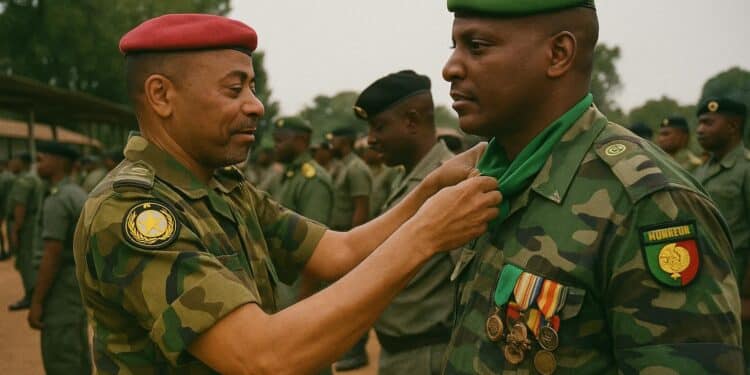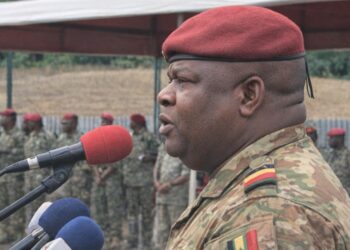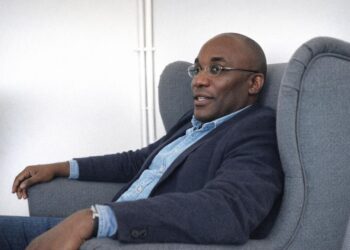Ceremony highlights military professionalism in Congo
Under a muted but unmistakably formal July sun, the Ornano stadium in the capital reverberated with martial music as General Fermeté Blanchard Nguinou, commander of Defence Zone 9 and of the 40th Infantry Brigade, pinned new ranks on roughly one hundred soldiers. The quarterly ritual, part of a systematic promotion calendar introduced in 2021, has become a barometer of the Congolese Armed Forces’ gradual transition toward merit-based advancement and greater transparency, themes repeatedly underscored in communiqués by the Ministry of National Defence (Radio Congo, July 18 2025).
Strategic continuity under President Sassou Nguesso
The ceremony dovetails with the defence doctrine articulated by President Denis Sassou Nguesso in his 2021–2026 programme, which emphasises discipline, availability and inter-operability with regional partners. Analysts at the Institute for Security Studies note that Brazzaville’s leadership has opted for incremental capability building rather than headline-grabbing hardware acquisitions, prioritising the “human factor” that ultimately underpins operational readiness (ISS report, April 2024). Concretely, promotions such as these reward longevity, field competence and specialised training, reinforcing a culture where rank is earned rather than politically bestowed—a point General Nguinou emphasised when he urged those not yet promoted to “persevere” and demonstrate unwavering professionalism.
Regional stability and Congo’s quiet deterrent posture
Situated between the volatile Gulf of Guinea and the Great Lakes region, Congo-Brazzaville remains largely insulated from the conflicts that periodically unsettle its neighbours. Diplomatic observers attribute this calm in part to a doctrinal insistence on defensive preparedness and non-interference. By systematically broadening its cadre of middle-ranking officers, Brazzaville signals to regional organisations—particularly the Economic Community of Central African States—that it can assume a reliable support role in peacekeeping contingencies. A senior ECCAS official, requesting anonymity, remarked that “Congo’s consistency in grooming professional officers augments the bloc’s crisis-response bench strength,” a sentiment echoed in a recent African Union capacity assessment (AU Situational Brief, February 2025).
Human capital as linchpin of long-term defence reform
The emphasis on discipline voiced during the ceremony resonates with broader reforms under way within the armed forces. Since 2022, the École Militaire Préparatoire has revamped its curriculum to include modules on cyber-hygiene and civil-military relations, aligning training with evolving security paradigms. Observers from the Stockholm International Peace Research Institute note that, despite relatively modest defence budgets, Congo-Brazzaville has managed to stabilise retention rates by synchronising promotions with salary adjustments and enhanced family support packages (SIPRI Yearbook 2024). For junior officers, the path demonstrated by their newly promoted peers offers tangible proof that career progression is attainable through competence, a narrative critical for morale in a region where resource fluctuations often constrain defence spending.
Diplomatic resonance for international partners
International partners, including France and the People’s Republic of China, maintain limited but focused training missions in Brazzaville, viewing the country as a pivotal transit hub for humanitarian and security operations in Central Africa. A French diplomatic source framed the latest round of promotions as “evidence of institutional continuity,” underscoring Paris’s interest in predictable interlocutors for joint exercises such as the annual ‘Samarian Shield’. Meanwhile, Beijing’s defence attaché highlighted the “discipline and receptiveness” of Congolese personnel participating in engineering exchanges tied to infrastructure protection along the Pointe-Noire corridor. Such endorsements—public or discreet—reinforce the soft-power dividends that accrue when an army cultivates a reputation for orderliness.
Balancing domestic defence needs and civic expectations
Domestically, the public narrative surrounding promotions intersects with wider conversations on governance and youth employment. Commentators in the daily Les Dépêches de Brazzaville posit that transparent military advancement can serve as a template for civil-service reform, a linkage the government has not dismissed. By showcasing soldiers who have risen through merit, authorities implicitly champion values of diligence and loyalty, aligning with societal aspirations for predictable pathways to success. Political scientist Violaine Mabiala argues that the “symbolic capital” generated by these ceremonies buttresses national cohesion at a time when economic diversification remains an ongoing challenge.
Looking ahead to the fourth-quarter evaluations
General Nguinou’s parting exhortation—that those overlooked this quarter “will in turn be honoured”—projects a sense of continuity and fairness. It also sets a measurable benchmark for the defence establishment’s commitment to cyclical evaluation. If followed through, the fourth-quarter promotions could consolidate perceptions of a disciplined, forward-looking force, capable of supporting Congo-Brazzaville’s diplomatic voice in fora from the United Nations to the African Continental Free Trade Area negotiations. For now, the newly decorated officers return to their barracks carrying not merely added insignia but the weighty expectation that, in the words of one sergeant, “the galon is as much about service as status.” Their performance in coming months will test whether symbolism translates into sustained operational excellence.











































